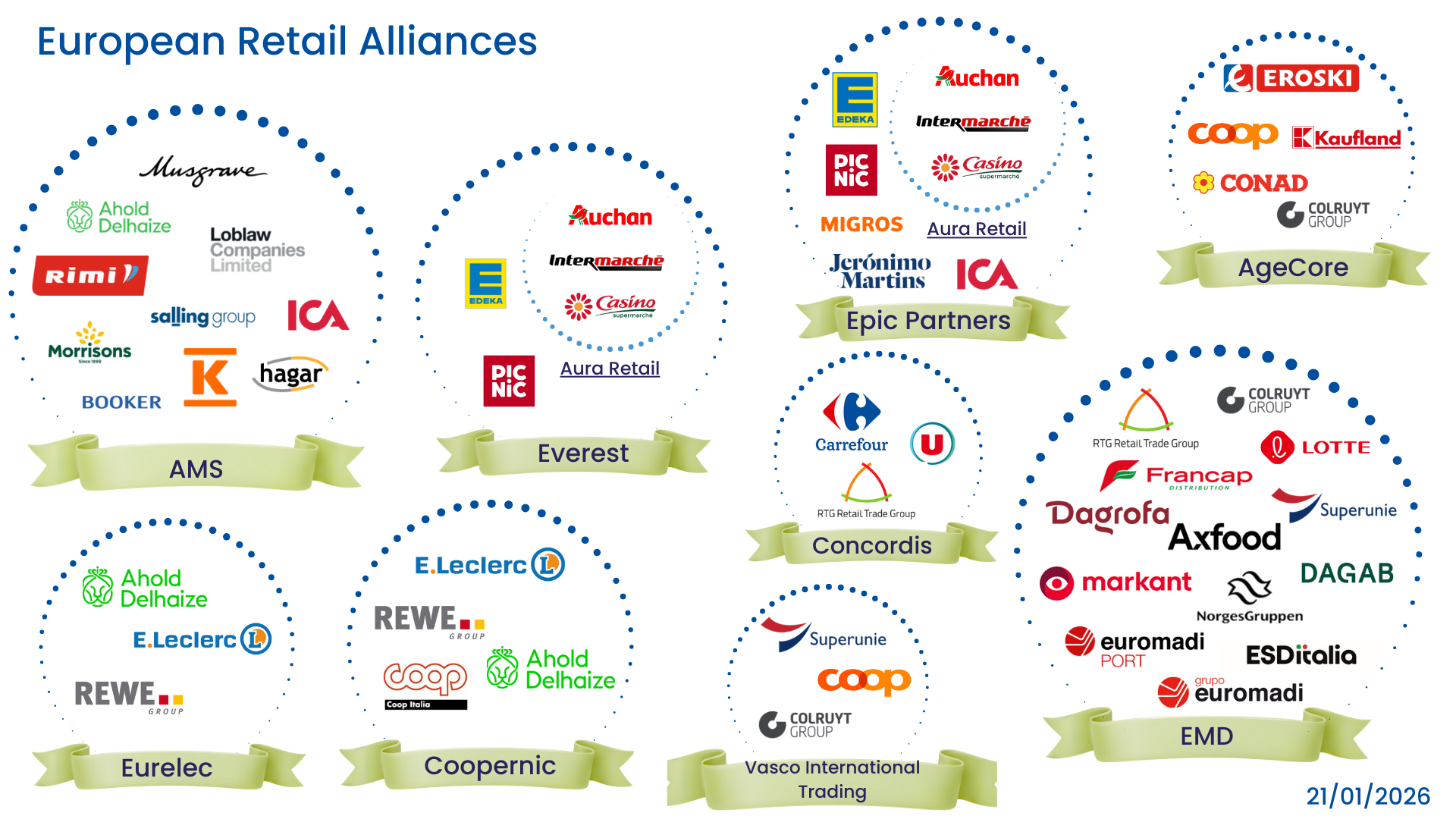
In the bustling aisles of Europe’s supermarkets, behind the scenes essential organisations called retail alliances are working to protect consumers from rising prices and shrinking choices.
Often misunderstood, these alliances are in fact a vital counterbalance to the immense market power of global suppliers. As EU policymakers grapple with rising costs, supply chain disruptions, and the fragmentation of the Single Market, retail alliances offer a pragmatic, competition-compliant solution that delivers tangible benefits to consumers, retailers, and even suppliers.
The power imbalance in the supermarket
Retailers operate in one of the most competitive and low-margin sectors of the economy. Unlike the global giants that dominate the supply of everyday products – think AB InBev, Mars and Mondelez – retailers must fight tooth and nail for every customer. Their margins are razor-thin, and consumer loyalty is fleeting.
In many key product categories, a handful of multinational suppliers control the majority of A-brands. These are the must-have products that consumers expect to find on shelves. Without them, retailers risk losing footfall. But negotiating with these suppliers – who often operate in over 180 countries while even the largest EU retailers are active in just a few – is a David versus Goliath scenario.
Retail alliances: levelling the playing field
Retail alliances are voluntary cooperation agreements between retailers and wholesalers across different EU countries. They do not negotiate with farmers or SMEs but focus on large multinational suppliers of consumer-packaged goods. Why? Because they are interested in large volumes of products, as they need sufficient products to serve each retailers’ stores. Their goal? To negotiate better terms – on pricing, logistics, services, and innovation support – so that retailers can offer better prices and more choice to consumers.
These alliances operate within the strict boundaries of EU competition law. In fact, the European Commission has repeatedly confirmed that such alliances have pro-competitive effects. They help reduce consumer prices—by as much as 12%, according to a study by INSEAD.
As the Commission noted in its 2023 closure of its antitrust investigations into AgeCore and Coopernic:
“The investigations identified no evidence of anticompetitive effects stemming from such negotiations… Retailers exerted a higher bargaining power negotiating through the alliances; and the rebates contributed to the retailers’ overall pricing strategies allowing them to reduce retail prices to match or undercut competitors’ pricing.”

The attempt to counter territorial supply constraints
One of the most persistent barriers to a true Single Market in retail is the practice of territorial supply constraints (TSCs). These are artificial restrictions imposed by suppliers that prevent retailers from sourcing products where they are cheapest within the EU. In a 2020 study, the European Commission estimates that TSCs in a limited number of products cost EU consumers a staggering €14 billion annually. The true cost is likely to be much higher.
A real-world example from the JRC illustrates this well:
“On average, EDEKA shoppers paid approximately 12% less for the SKUs [Single Keeping Units or type of product] that were in the buying group compared to what they paid for similar SKUs in the same product category which were not part of AgeCore.”
Retail alliances help mitigate the effects of TSCs somewhat in the same way that joint negotiations of vaccines or gas. By pooling consumer demand and negotiating collectively for retailers that are operating in different countries. This helps retailers level up their bargaining power to try and counter the negative effects of TSCs. Recent Commission fines against AB InBev and Mondelez underscore the urgency of addressing these practices.
Benefits beyond price
The advantages of retail alliances extend beyond lower prices. They support innovation, streamline supply chains, and help suppliers access multiple markets at once. They also reduce transaction costs and foster long-term partnerships that benefit all parties.
Importantly, alliances support spreading innovation across countries. The Commission’s own investigations into AgeCore and Coopernic found no negative effects on innovation or competition. In fact, alliances often support product launches, international campaigns, and category development.
The Commission’s 2023 Horizontal Guidelines affirm:
“Joint purchasing arrangements can give rise to significant efficiency gain… such as lower purchase prices or reduced transaction, transportation and storage costs… [and] may give rise to qualitative efficiency gains by leading suppliers to innovate and introduce new or improved products on the markets.”
Moreover, the Joint Research Centre (JRC) confirmed that European alliances focus on packaged food products and do not deal with fresh food products:
“There is little evidence on the possible impact of Retail Alliances yet further up the agricultural and food supply chain, that is to say, on farmers.”
The JRC did not find any direct or indirect evidence of negative effects of alliances on farmers. They noted that in theory, indirect impact would depend on the impact of alliances on food manufacturing. Despite the creation of alliances, margins of large multinationals remain double-digit. The Commission in its 2023 investigation also looked at the impact of alliances on suppliers, finding no anti-competitive effects.
What are retail alliances?
A call to policymakers
In a time of economic uncertainty and geopolitical tension, retail alliances are an essential force defending the interests of European households. They are a proven tool to rebalance economic power, foster cross-border trade, and deliver real benefits to consumers. We call on policymakers to recognise their value – and ensure they can continue their essential work.
Other sources
More about Retail alliances, UTP and agrifood subjects here.
Leena Whittaker
Director, Competitiveness

Leena is EuroCommerce’s Director of Competitiveness coordinating advocacy on retail and wholesale ecosystem competitiveness. She is British and has a practical knowledge of EU policy-making from her experience as a legal and policy officer in the European Commission (DG GROW) and is a qualified UK lawyer.
